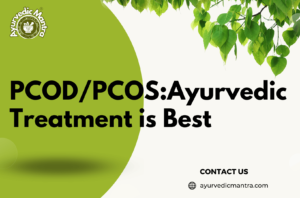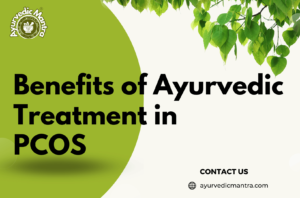
PCOD/PCOS: Ayurvedic Treatment is Best
Introduction Polycystic Ovary Disorder (PCOD) or Polycystic Ovary Syndrome (PCOS) is a common endocrine disorder affecting millions of women worldwide. It leads to hormonal imbalances,


Polycystic Ovary Syndrome (PCOS) is a complex hormonal disorder that affects many women worldwide. Characterized by a range of symptoms, PCOS can significantly impact a woman’s health and well-being. This comprehensive guide will delve into the 12 critical symptoms of PCOS and explore how to identify this condition.
One of the most common signs of PCOS is irregular periods. Women with PCOS may experience infrequent, heavy, or prolonged menstrual cycles. Keeping track of your menstrual cycle and noting any irregularities can help identify this symptom.
Unwanted hair growth on the face, chest, back, or other body areas, known as hirsutism, is another telltale sign of PCOS. This occurs due to elevated levels of androgens, commonly called male hormones.
Fluctuating hormone levels can lead to acne and oily skin for individuals with PCOS. This skin condition can be particularly distressing and may require specialized skincare routines.
Many women with PCOS struggle with weight gain or find it difficult to lose weight. The hormonal imbalances associated with PCOS can make managing weight more challenging.
While excess hair growth is a symptom, hair thinning and hair loss on the scalp can also occur in women with PCOS. This condition is often referred to as female pattern baldness.
Insulin resistance is a metabolic condition where the body’s cells do not respond effectively to insulin. PCOS is linked to insulin resistance, which can contribute to weight gain and an increased risk of type 2 diabetes.
Hormonal fluctuations in women with PCOS can lead to mood swings, irritability, and depression. Addressing these emotional symptoms as part of a comprehensive treatment plan is essential.
PCOS can also impact sleep patterns, leading to difficulties falling asleep or staying asleep throughout the night. Poor sleep quality can further exacerbate other PCOS symptoms.
Some women with PCOS report frequent headaches or migraines. While the exact connection is not fully understood, hormonal imbalances may trigger these headaches.
Darkening of the skin, especially in areas such as the neck, groin, and underarms, can occur due to insulin resistance. This condition is known as acanthosis nigricans.
Some women with PCOS may experience pelvic pain or discomfort. This symptom is typically associated with cysts on the ovaries, a common feature of the condition.
PCOS is a leading cause of infertility in women. Irregular ovulation and hormonal imbalances can make it challenging to conceive.
In conclusion, being vigilant about these 12 PCOS symptoms can help you identify this condition early and seek appropriate medical guidance. If you suspect you have PCOS, it’s essential to consult a healthcare professional who can provide an accurate diagnosis and personalized treatment plan. Remember, understanding your body and being proactive about your health are crucial steps toward managing PCOS effectively.
You can read more about where to get support in our blog: Gaining weight due to PCOD? Here are 10 tips to fight it
A1: PCOS, or Polycystic Ovary Syndrome, is a hormonal disorder that affects the ovaries and often leads to various symptoms, including irregular periods, infertility, weight gain, and excessive hair growth. It can impact a woman’s physical and emotional well-being, requiring proper management and care.
A2: While the exact cause of PCOS is not fully understood, it is believed to be influenced by genetic, hormonal, and lifestyle factors. Insulin resistance and elevated levels of androgens (male hormones) are thought to play a significant role in the development of the condition.
A3: PCOS presents a variety of symptoms, including irregular menstrual cycles, hirsutism (excessive hair growth), acne, weight gain, hair thinning, mood swings, and fertility issues. Identifying these symptoms is crucial for early diagnosis and effective management.
A4: Diagnosis typically involves a combination of medical history assessment, physical examination, blood tests to measure hormone levels, and possibly ultrasound imaging to detect cysts on the ovaries. A comprehensive evaluation helps healthcare providers make an accurate diagnosis.
A5: Yes, PCOS is a leading cause of female infertility. Irregular ovulation and hormonal imbalances can make it challenging to conceive. However, with proper medical intervention and lifestyle changes, many women with PCOS can improve their chances of getting pregnant.
A6: Treatment for PCOS focuses on managing symptoms and reducing the associated health risks. Lifestyle changes such as a balanced diet, regular exercise, and weight management are often recommended. Additionally, medications may be prescribed to regulate menstrual cycles, control insulin resistance, and address other symptoms.
A7: A healthy diet rich in whole grains, lean proteins, fruits, and vegetables can help regulate insulin levels and manage weight, which are essential factors in PCOS management. Regular exercise also aids in weight control, improves insulin sensitivity, and promotes overall well-being.
A8: Yes, women with PCOS are at an increased risk of developing other health conditions, including type 2 diabetes, cardiovascular disease, and endometrial cancer. Proper management of PCOS through lifestyle changes and medical treatments can help reduce these risks.
A9: PCOS symptoms can vary during pregnancy. Some women experience improvement in symptoms, while others may see little change or an exacerbation. Pregnant women with PCOS need regular prenatal care and work closely with their healthcare providers to monitor and manage their condition.
A10: Yes, ongoing research is dedicated to unraveling the complexities of PCOS and developing more effective treatment strategies. Scientists and medical professionals continually work to improve our understanding of the condition’s underlying mechanisms and its impact on women’s health.

Introduction Polycystic Ovary Disorder (PCOD) or Polycystic Ovary Syndrome (PCOS) is a common endocrine disorder affecting millions of women worldwide. It leads to hormonal imbalances,

Introduction Losing weight is a journey that requires dedication, consistency, and self-care. While there are numerous weight loss techniques out there, not all of them

Polycystic Ovary Syndrome (PCOS) is a hormonal disorder that affects millions of women worldwide. It can lead to various health complications, such as irregular periods,

In recent years, Ayurveda, an ancient system of natural healing originating from India, has gained significant popularity as an alternative approach to treating various health

आजकल वजन बढ़ने और चर्बी की वृद्धि होने की समस्या एक आम समस्या बन गई है। बढ़ते वजन और अतिरिक्त चर्बी के कारण न केवल

प्रस्तावना: आजकल वजन बढ़ने और ओबेसिटी की समस्या एक आम समस्या बन गई है। बढ़ते वजन के कारण न केवल शारीरिक समस्याएं होती हैं, बल्कि
